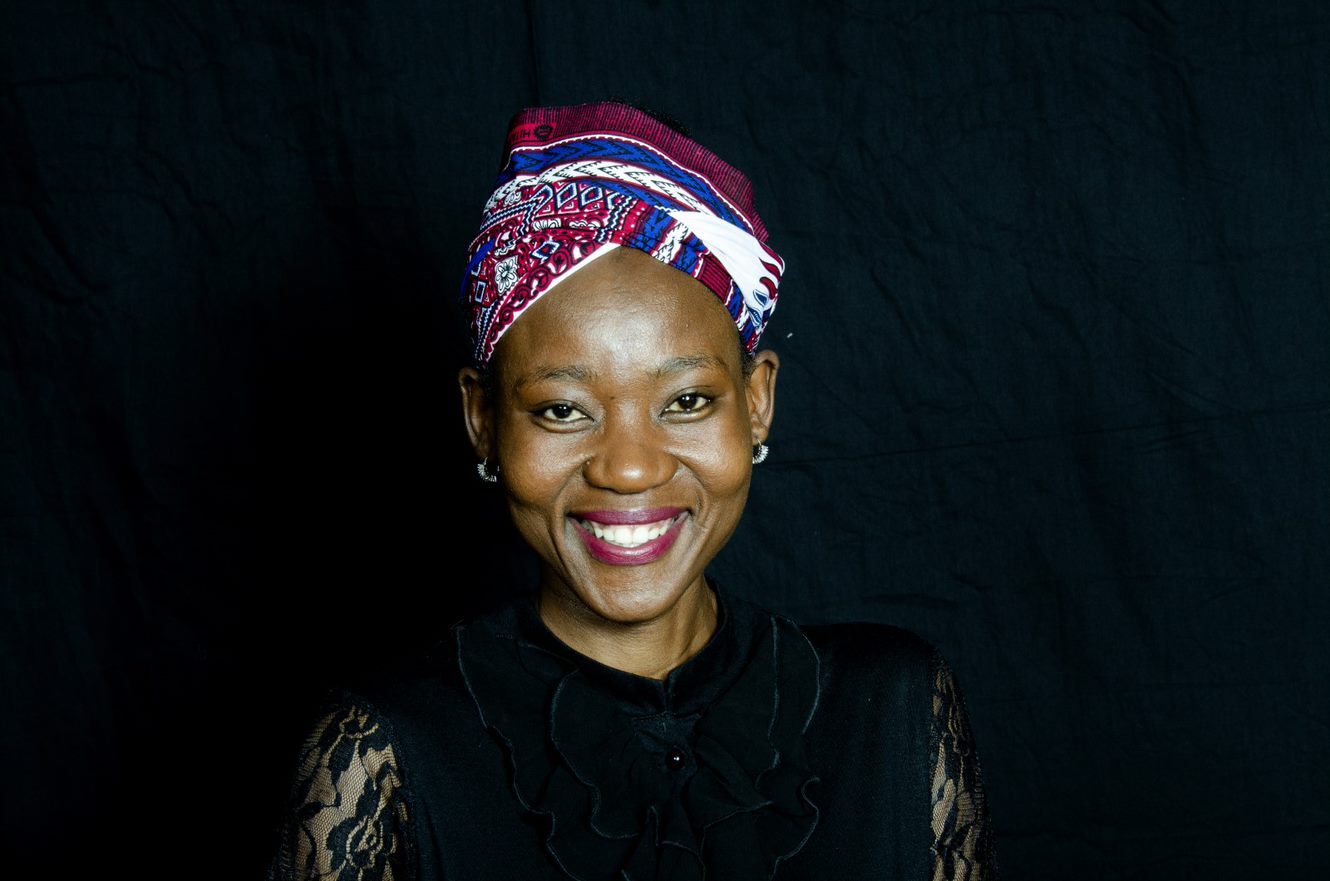Puleng Segalo
Title
Puleng Segalo
Rights
Image used with permission, all rights remain with the author. Photograph credit to Mr Given Maluleka, University of South Africa.
Birthplace
South Africa
Primary Sources
Segalo, P. (2022). Embroidered Voices: Exposing Hidden Trauma Stories of Apartheid. Textile-Cloth and Culture.
https://doi.org/10.1080/14759756.2022.2036071
Segalo, P. (2020). Rachel Jane Liebert, Psycurity: Colonialism, paranoia, and the war on imagination. Feminism & Psychology, 30(3), 418–422.
https://doi.org/10.1177/0959353520912975
Puleng Segalo. (2020). Poison in the bone marrow: Complexities of liberating and healing the nation. 76(3), e1–e6.
https://doi.org/10.4102/hts.v76i3.6047
Segalo, P., & Fine, M. (2020). Under lying conditions of gender-based violence-Decolonial feminism meets epistemic ignorance: Critical transnational conversations. Social and Personality Psychology Compass, 14(10),1-10.
https://doi.org/10.1111/spc3.12568
Kiguwa, P., & Segalo, P. (2018). Decolonising Psychology In Residential And Open Distance E-Learning Institutions: Critical Reflections. South African Journal Of Psychology, 48(3), 310-318.
Segalo, P. (2016). Using Cotton, Needles And Threads To Break The Women's Silence: Embroideries As A Decolonising Framework. International Journal Of Inclusive Education, 20(3), 246-260.
https://doi.org/10.1080/13603116.2015.1047661
Segalo, P. (2015). Trauma and Gender. Social and Personality Psychology Compass, 9(9), 447.
https://doi.org/10.1111/spc3.12192
Segalo, P., Manoff, E., & Fine, M. (2015). Working With Embroideries And Counter-Maps: Engaging Memory And Imagination Within Decolonizing Frameworks. CUNY Graduate Center.
https://academicworks.cuny.edu/gc_pubs/526/
Segalo, P. (2014). Embroidery as narrative: Black South African women’s experiences of suffering and healing. Agenda: Empowering Women for Gender Equity, 28(1 (99)), 44–53.
https://doi.org/10.2307/43824451
https://doi.org/10.1080/14759756.2022.2036071
Segalo, P. (2020). Rachel Jane Liebert, Psycurity: Colonialism, paranoia, and the war on imagination. Feminism & Psychology, 30(3), 418–422.
https://doi.org/10.1177/0959353520912975
Puleng Segalo. (2020). Poison in the bone marrow: Complexities of liberating and healing the nation. 76(3), e1–e6.
https://doi.org/10.4102/hts.v76i3.6047
Segalo, P., & Fine, M. (2020). Under lying conditions of gender-based violence-Decolonial feminism meets epistemic ignorance: Critical transnational conversations. Social and Personality Psychology Compass, 14(10),1-10.
https://doi.org/10.1111/spc3.12568
Kiguwa, P., & Segalo, P. (2018). Decolonising Psychology In Residential And Open Distance E-Learning Institutions: Critical Reflections. South African Journal Of Psychology, 48(3), 310-318.
Segalo, P. (2016). Using Cotton, Needles And Threads To Break The Women's Silence: Embroideries As A Decolonising Framework. International Journal Of Inclusive Education, 20(3), 246-260.
https://doi.org/10.1080/13603116.2015.1047661
Segalo, P. (2015). Trauma and Gender. Social and Personality Psychology Compass, 9(9), 447.
https://doi.org/10.1111/spc3.12192
Segalo, P., Manoff, E., & Fine, M. (2015). Working With Embroideries And Counter-Maps: Engaging Memory And Imagination Within Decolonizing Frameworks. CUNY Graduate Center.
https://academicworks.cuny.edu/gc_pubs/526/
Segalo, P. (2014). Embroidery as narrative: Black South African women’s experiences of suffering and healing. Agenda: Empowering Women for Gender Equity, 28(1 (99)), 44–53.
https://doi.org/10.2307/43824451
Secondary Sources
Qhogwana, S., & Segalo, P. (2022). Women offenders’ experiences of rehabilitation in a South African correctional centre. Journal of Psychology in Africa.
https://doi.org/10.1080/14330237.2021.2002032
Luttrell-Rowland, M., Engebretson, J., & Segalo, P. (2021). Shaping policy, sustaining peace: Intergenerational activism in the policy ecosystem. Agenda: Empowering Women for Gender Equity, 35(1), 109–119.
https://doi.org/10.1080/10130950.2021.1883926
Carolissen, R., Canham, H., Fourie, E., Graham, T., Segalo, P., & Bowman, B. (2017). Epistemological Resistance Towards Diversality: Teaching Community Psychology As A Decolonial Project. South African Journal Of Psychology, 47(4), 495-505.
https://journals.co.za/doi/abs/10.1177/0081246317739203
Cakata, Z., & Segalo, P. (2017). Obstacles to Post-Apartheid Language Policy Implementation: Insights From Language Policy Experts. Southern African Linguistics and Applied Language Studies, 35(4), 321–329.
https://doi.org/10.2989/16073614.2017.1373364
Parry, B.R. and Segalo, P. (2017). Eating Burnt Toast: The Lived Experiences of Female Breadwinners in South Africa. Journal of International Women's Studies, 18(4), 182-196.
https://vc.bridgew.edu/jiws/vol18/iss4/13
Puleng Segalo, Einat Manoff, & Michelle Fine. (2015). Working With Embroideries and Counter-Maps: Engaging Memory and Imagination Within Decolonizing Frameworks. Journal of Social and Political Psychology, 3(1), 342–364. https://doi.org/10.5964/jspp.v3i1.145
Mbatha, K. (2013). People Behind The Papers: 27 Stories Captured So Far, More To Follow!: Project Report. New Voices, Psychology, 9(1-2), 139-141.
https://doi.org/10.1080/14330237.2021.2002032
Luttrell-Rowland, M., Engebretson, J., & Segalo, P. (2021). Shaping policy, sustaining peace: Intergenerational activism in the policy ecosystem. Agenda: Empowering Women for Gender Equity, 35(1), 109–119.
https://doi.org/10.1080/10130950.2021.1883926
Carolissen, R., Canham, H., Fourie, E., Graham, T., Segalo, P., & Bowman, B. (2017). Epistemological Resistance Towards Diversality: Teaching Community Psychology As A Decolonial Project. South African Journal Of Psychology, 47(4), 495-505.
https://journals.co.za/doi/abs/10.1177/0081246317739203
Cakata, Z., & Segalo, P. (2017). Obstacles to Post-Apartheid Language Policy Implementation: Insights From Language Policy Experts. Southern African Linguistics and Applied Language Studies, 35(4), 321–329.
https://doi.org/10.2989/16073614.2017.1373364
Parry, B.R. and Segalo, P. (2017). Eating Burnt Toast: The Lived Experiences of Female Breadwinners in South Africa. Journal of International Women's Studies, 18(4), 182-196.
https://vc.bridgew.edu/jiws/vol18/iss4/13
Puleng Segalo, Einat Manoff, & Michelle Fine. (2015). Working With Embroideries and Counter-Maps: Engaging Memory and Imagination Within Decolonizing Frameworks. Journal of Social and Political Psychology, 3(1), 342–364. https://doi.org/10.5964/jspp.v3i1.145
Mbatha, K. (2013). People Behind The Papers: 27 Stories Captured So Far, More To Follow!: Project Report. New Voices, Psychology, 9(1-2), 139-141.
Extra Resources
SABC News reports on Puleng Segalo winning Distinguished Young Woman Scientists Award 2014: Aug 23, 2014, YouTube. Accessed Nov 24 2022.
https://youtu.be/Dus1p0qRh3k
https://youtu.be/Dus1p0qRh3k
Collection
Citation
“Puleng Segalo,” Decoloniality, First Nations Thinkers and thought and practices from the Global South, accessed December 6, 2025, https://omeka.cloud.unimelb.edu.au/decoloniality-and-thinkers-from-the-global-south/items/show/42.
